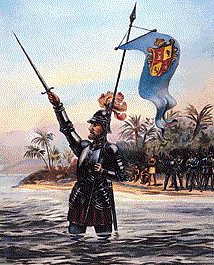Next year marks the 500th anniversary of the European discovery of the Pacific after Vasco Núñez de Balboa was lured by an Indian cacique’s promise of “another ocean, where there is plenty of gold.” Last week, four of Latin America’s fastest-growing economies renewed this quest for Pacific gold when they signed a “deep integration” pact. Mexico, Colombia, Peru and Chile, with combined economic output of $2tn, say the alliance will help them expand trade with Asia. It is another sign of how the world’s economic centre is shifting from the Atlantic.
The pact was signed, symbolically, at one of the earth’s most powerful deep space telescopes, in Chile’s Atacama Desert. That the observatory lies 2,600m above sea level also lent the ceremony a certain breathlessness. After all, there has been a lot of talk about regional integration over the past two decades, but far less action. The Mercosur trade bloc, forged in the 1990s by Brazil and Argentina, is foundering as both countries respond to economic problems by withdrawing behind trade barriers. The Andean Community has meanwhile been part dismembered by socialist Venezuela. The Pacific Alliance, with its talk of the free movement of goods, capital and labour, is a return to the liberal spirit of the past: a group of countries that believe the best route to development is open markets, foreign investment and free trade. Potentially, it also establishes a regional counterweight to Brazil.
In many ways, politicians are merely catching up with business. Chilean retailers operate in Colombia and Peru; Colombian utilities in Peru; Mexican companies in Colombia; and LAN, the Chilean airline, everywhere. The new pact faces formidable obstacles, though. Relations between Chile and Peru are dogged by memories of bitter 19th century border disputes. The pact’s countries meanwhile run for 7,000 miles from top to toe. MILA, an alliance between the Bogotá, Lima and Santiago stock markets, provides a cautionary warning: trade volumes have been sluggish since it was founded a year ago.
Still, at least its members have gone about negotiations in a businesslike way. Early talks, for example, were conducted via video conferencing, rather than the usual grandstanding summitry. Although there is a risk of over-categorisation, the contrast is striking between the pact’s liberalising attitudes and that of the more protectionist and sluggish Brazilian and Argentine economies on the Atlantic seaboard. They should take note; others have. A EU-style free trade area without the countless petty regulations and requirements imposed by Brussels would position South America as a powerful economic competitor to its neighbors north of the Rio Grande.

No comments:
Post a Comment